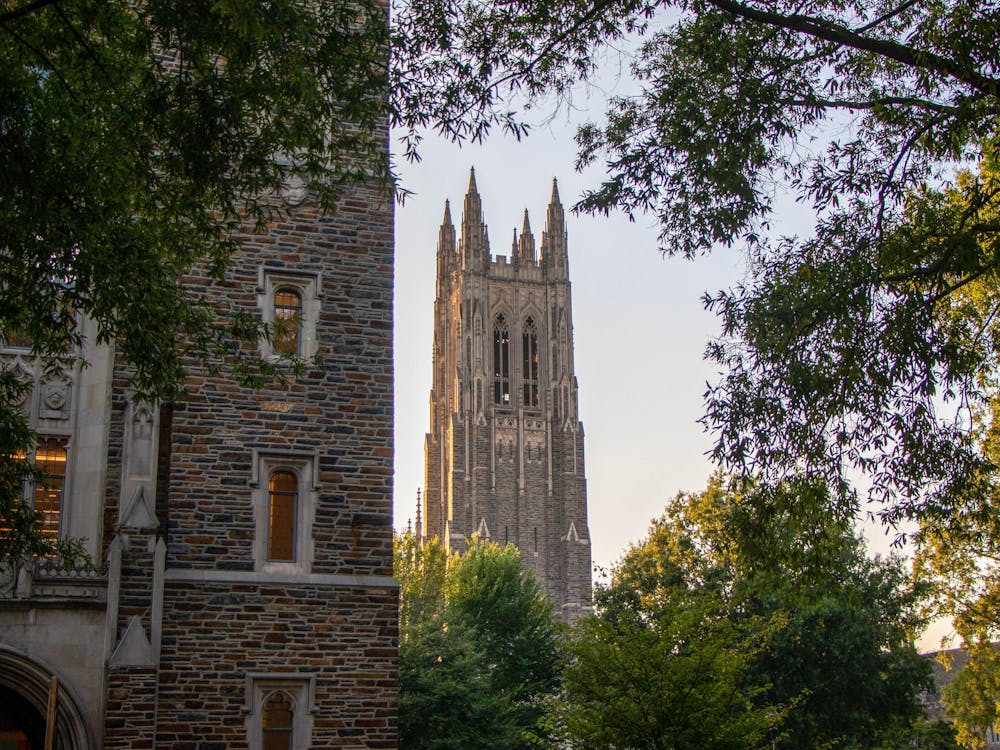Some students and faculty members voiced concerns about the methodology behind and interpretation of the recent Duke Campus Culture Survey, which hopes to effectively guide future equity initiatives on campus.
The survey, administered by Duke administration every three years, intends to understand how to foster a more “inclusive and equitable” campus community. Duke piloted an earlier version of the survey in 2021, which was deemed “the most comprehensive survey that Duke had ever executed on issues of diversity, equity and inclusion.”
Students first received the survey in a Jan. 29 email from President Vincent Price. The initial deadline to complete the survey was Feb. 16, but it was later extended first to March 1 and later to March 17.
Kimberly Hewitt, vice president of institutional equity and chief diversity officer, wrote in an email to The Chronicle that the extensions were intended to increase participation rates “so that more voices and perspectives would be heard” and thus limit bias. “High-level” results will be released in April, with further aggregated information due for release in the fall.
The 2024 survey addressed various aspects of campus life and students’ backgrounds, including demographic information, experiences with discrimination, Duke’s commitment to diversity, equal opportunity for historically disadvantaged groups and whether respondents felt they had a voice in the community.
While students and faculty members believed the survey covered critical topics, they raised doubts about how accurately the survey results would represent the views of the Duke community.
Student input
Students shared that they did not complete the survey either because they had other priorities or did not believe it would contribute to meaningful change on campus.
“I don’t care much about the Campus Culture Survey or really any survey Duke gives out, since it feels like [there are] hardly any results that arise over the responses,” wrote first-year Ahmad Choudhary in a message to The Chronicle. “[Their] purpose feels more like being used for research … than for actual change.”
First-year Haley Jansons similarly stated that the survey questions appeared too general and that she is unsure how students' answers would make “targeted and productive changes.”
“Hearing it would take 10-15 minutes made me even less likely to take it,” senior Shreya Joshi said. “I think that it is an incredibly important survey that [administration] puts out, I just felt the marketing wasn’t done in a way that would speak to students.”
Joshi also said that having users log in using NetIDs and multi-factor authentication made the process cumbersome for many students and may have discouraged some from filling it out.
Faculty perspectives
Sunshine Hillygus, professor of political science and director of the Duke Initiative on Survey Methodology, was involved in designing the survey. She noted that University administration asked for questions to remain consistent over time in order to allow for cross-year comparisons.
“As the saying goes, ‘you can’t measure change if you change the measure,’” Hillygus wrote in an email to The Chronicle.
David Banks, professor of the practice of statistics, independently examined the survey. He cautioned that without knowing the specific purposes of the survey, it was challenging for him to evaluate its design and methodology. He said that it was not clear to him “what decision path would follow” from the Campus Culture Survey’s results.
However, Banks noted that the survey’s inclusion of demographic information may help reduce bias through comparison to existing demographic data for the full student body, while also adding that the 2024 survey could serve as a benchmark for future comparisons.
Banks qualified that although demographic metrics can help measure diversity, they are not the only applicable metric.
“[Duke students] are also all smart, all well-to-do and all healthy. And from that standpoint, they’re an incredibly homogeneous group,” Banks said.
Unlike students, Banks did not believe that the survey was excessively long, but he acknowledged it would have been helpful to designate time in class for students to take the survey.
John Rose, instructor in the Kenan Institute of Ethics and associate director of the Civil Discourse Project, found a lack of emphasis on intellectual and ideological diversity in the survey.
“It's no secret that elite higher education doesn't have the robust culture of free expression that many of us would want,” Rose said. “… A portion of the public feels like their views aren't getting a fair hearing, or are adequately represented on campus. We could do better here.”
According to Rose, people who identify as conservative or more religiously observant are underrepresented at Duke and might be less likely to fill out the survey.
“Given that the survey’s definition of ‘diversity’ included diversity of thought, it would have been interesting to include a question about Duke’s commitment to hiring and promotion of those who add intellectual diversity to the campus, particularly those with political views uncommon among the faculty,” Rose later wrote in an email to The Chronicle.
Banks agreed, recommending observational studies and small group classroom exercises to identify whether “conservative bias may be present.”
Hewitt wrote in her statement that the survey “includes questions about the experiences of community members based upon political thought” and that the University administration hoped to “learn more from the [survey’s] free response questions.”
Banks also warned about survey fatigue affecting results, adding that he had not filled out the survey himself.
“I get lots of surveys all the time, and over the years, I've just built up a resistance to them,” Banks said.
Get The Chronicle straight to your inbox
Signup for our weekly newsletter. Cancel at any time.
Samanyu Gangappa is a Trinity first-year and local/national news editor for the news department.

